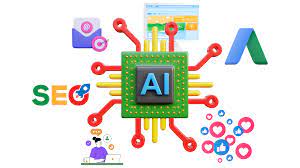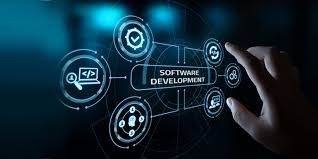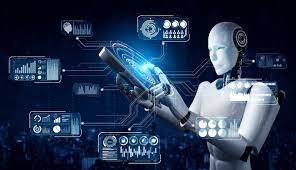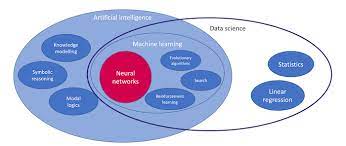AI in Digital Marketing: Transforming the Landscape
In recent years, artificial intelligence (AI) has become a game-changer in the field of digital marketing. As businesses seek more effective ways to engage with their audiences, AI offers innovative solutions that enhance personalisation, improve customer insights, and optimise marketing strategies.
The Role of AI in Digital Marketing
AI technologies are revolutionising how marketers approach their campaigns. By leveraging machine learning algorithms and data analytics, AI can process vast amounts of data to uncover patterns and trends that humans might miss. This capability allows marketers to make informed decisions based on real-time insights.
Enhanced Personalisation
One of the most significant benefits of AI in digital marketing is its ability to deliver personalised experiences at scale. AI can analyse user behaviour and preferences to create tailored content and recommendations. This level of personalisation helps build stronger connections with customers and increases engagement rates.
Improved Customer Insights
AI-driven analytics tools provide marketers with deeper insights into customer behaviour. By analysing data from various sources such as social media, website interactions, and purchase history, AI can help identify target audiences more accurately. These insights enable businesses to craft more effective marketing strategies that resonate with their audience.
Optimised Advertising
AI is also transforming digital advertising by optimising ad placements and targeting. Programmatic advertising platforms use AI algorithms to automate the buying process, ensuring that ads reach the right audience at the right time. This precision targeting reduces wasted ad spend and improves return on investment (ROI).
The Future of AI in Digital Marketing
The integration of AI into digital marketing is still evolving, but its potential is vast. As technology advances, we can expect even more sophisticated applications that will further enhance marketing efforts. From chatbots providing instant customer support to predictive analytics forecasting market trends, the possibilities are endless.
However, as with any technology, there are challenges to consider. Ensuring data privacy and addressing ethical concerns around AI usage will be crucial as these technologies become more prevalent in marketing strategies.
Conclusion
AI is undeniably reshaping the digital marketing landscape by offering tools that increase efficiency and effectiveness. Businesses that embrace these technologies will be better positioned to meet consumer demands and stay competitive in an ever-changing market environment.
Exploring the Role of AI in Digital Marketing: FAQs and Future Insights
- Is AI replacing digital marketing?
- Will AI take over digital marketing?
- How AI will impact digital marketing?
- Which digital marketing companies use AI?
- What is AI marketing examples?
- Can you make money with AI marketing?
- How do you do AI marketing?
- What is the future of AI in digital marketing?
Is AI replacing digital marketing?
AI is not replacing digital marketing; rather, it is enhancing and transforming the way digital marketing is conducted. AI technologies provide marketers with advanced tools to analyse data, personalise customer experiences, and optimise advertising strategies more efficiently than ever before. While AI can automate certain tasks such as data analysis and customer segmentation, it does not eliminate the need for human creativity and strategic thinking. Marketers still play a crucial role in crafting compelling narratives and understanding the nuances of consumer behaviour. In essence, AI serves as a powerful ally that empowers marketers to make more informed decisions and achieve better results in their campaigns.
Will AI take over digital marketing?
While AI is significantly transforming the digital marketing landscape, it is unlikely to completely take over the field. Instead, AI serves as a powerful tool that enhances and complements human capabilities. By automating repetitive tasks, providing data-driven insights, and enabling personalised customer interactions at scale, AI allows marketers to focus on strategy, creativity, and building meaningful relationships with their audience. The human element remains crucial in understanding nuanced consumer behaviour and crafting compelling narratives that resonate emotionally. Therefore, rather than replacing marketers, AI acts as an enabler that empowers them to work more efficiently and effectively.
How AI will impact digital marketing?
AI is set to significantly impact digital marketing by enhancing personalisation, improving customer engagement, and optimising campaign strategies. With AI’s ability to analyse vast amounts of data quickly, marketers can gain deeper insights into consumer behaviour and preferences, allowing for more targeted and personalised marketing efforts. AI-driven tools can automate tasks such as content creation, ad placement, and customer interactions through chatbots, freeing up valuable time for marketers to focus on strategy. Additionally, predictive analytics powered by AI can forecast trends and consumer needs, enabling businesses to stay ahead of the competition. As AI technology continues to evolve, its integration into digital marketing will lead to more efficient processes and improved return on investment.
Which digital marketing companies use AI?
Many leading digital marketing companies have embraced AI to enhance their services and deliver better results for their clients. Companies such as Google, Facebook, and HubSpot utilise AI to optimise advertising strategies and personalise user experiences. Google, for instance, uses AI in its Google Ads platform to automate bidding and improve targeting accuracy. Facebook employs AI algorithms to analyse user data, helping businesses reach their desired audience more effectively through tailored ads. HubSpot integrates AI into its marketing automation tools to provide personalised content recommendations and streamline customer interactions. These companies, among others, are leveraging AI technologies to stay ahead of the curve in the competitive digital marketing landscape.
What is AI marketing examples?
AI marketing examples encompass a variety of applications that leverage artificial intelligence to enhance marketing efforts. One common example is the use of chatbots, which provide real-time customer service and support on websites, offering personalised assistance based on user queries. Another example is predictive analytics, where AI analyses data to forecast consumer behaviour and trends, allowing businesses to tailor their strategies accordingly. AI-driven content creation tools can generate engaging copy or visuals for social media and email campaigns, while programmatic advertising uses AI algorithms to automate ad placements, ensuring they reach the most relevant audiences efficiently. These examples demonstrate how AI can optimise different aspects of digital marketing, from customer interaction to strategic planning.
Can you make money with AI marketing?
Yes, businesses can indeed make money with AI marketing. By leveraging AI technologies, companies can optimise their marketing strategies to achieve better results and higher returns on investment. AI enables more precise targeting of audiences through data analysis, ensuring that marketing efforts are directed towards those most likely to convert. Additionally, AI-driven personalisation enhances customer experiences, leading to increased engagement and loyalty. Automation of repetitive tasks also allows marketers to focus on strategic initiatives, improving efficiency and reducing costs. As a result, businesses can maximise their revenue potential by using AI to create more effective and efficient marketing campaigns.
How do you do AI marketing?
AI marketing involves using artificial intelligence technologies to enhance and automate various aspects of digital marketing strategies. The process typically begins with data collection, where AI tools gather and analyse vast amounts of information from multiple sources such as social media, customer interactions, and website analytics. This data is then processed using machine learning algorithms to identify patterns and insights about consumer behaviour and preferences. Based on these insights, AI can personalise marketing content, optimise advertising campaigns by targeting the right audience at the right time, and even predict future trends. Additionally, AI-powered chatbots can provide instant customer support, improving user experience and engagement. By integrating AI into digital marketing efforts, businesses can achieve higher efficiency, better ROI, and more effective customer targeting.
What is the future of AI in digital marketing?
The future of AI in digital marketing is set to be transformative, as advancements in technology continue to expand the capabilities of AI-driven tools. Marketers can expect even greater levels of personalisation and automation, allowing for more precise targeting and engagement with audiences. Predictive analytics will become increasingly sophisticated, enabling businesses to anticipate consumer needs and market trends with greater accuracy. Moreover, AI will likely play a pivotal role in enhancing customer experiences through innovations like chatbots and virtual assistants that provide real-time support. As AI continues to evolve, it will undoubtedly become an integral component of digital marketing strategies, driving efficiency and effectiveness while also raising important considerations around data privacy and ethical use.






